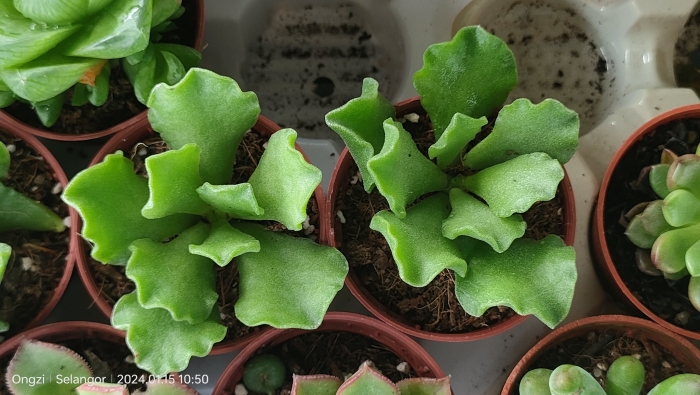Crinkle Leaf Plant
(Adromischus cristatus)
Crinkle Leaf Plant (Adromischus cristatus)
/
/

© Ong Jyh Seng
CC BY-SA 4.0
Image By:
© Ong Jyh Seng
Recorded By:
Copyright:
CC BY-SA 4.0
Copyright Notice:
Photo by: © Ong Jyh Seng | License Type: CC BY-SA 4.0 | License URL: http://creativecommons.org/licenses/by-sa/4.0/ | Uploader: ongzi | Publisher: iNaturalist |























Estimated Native Range
Summary
Adromischus cristatus, commonly known as Crinkle Leaf Plant, is a succulent perennial herb native to rocky outcrops and slopes in the Eastern Cape Province of South Africa. It typically grows with short, erect branches and is characterized by its distinctive triangular, crinkly leaves that are covered in fine aerial roots, giving it a unique texture. The plant reaches a modest size, usually not exceeding 8 inches (20 cm) in height. In spring, Adromischus cristatus produces tubular white flowers with hints of red, emerging on long stalks above the foliage. The flowers are modestly showy and add a delicate touch to the plant’s appearance.
The Crinkle Leaf Plant is valued for its ease of maintenance and its attractive, textured foliage, which makes it a popular choice for rock gardens, succulent collections, and as a potted houseplant. It thrives in bright light with good airflow and requires a well-draining soil mix to prevent root rot. Watering should be done only when the soil is dry to the touch, and it is important to reduce watering during the winter months to mimic its natural dormant period. While it is hardy to USDA hardiness zone 10, it can withstand brief periods of freezing temperatures; however, it should be protected from frost to prevent damage. Adromischus cristatus is not typically associated with serious diseases or pests, but overwatering can lead to root rot, and mealybugs may occasionally infest the plant.CC BY-SA 4.0
The Crinkle Leaf Plant is valued for its ease of maintenance and its attractive, textured foliage, which makes it a popular choice for rock gardens, succulent collections, and as a potted houseplant. It thrives in bright light with good airflow and requires a well-draining soil mix to prevent root rot. Watering should be done only when the soil is dry to the touch, and it is important to reduce watering during the winter months to mimic its natural dormant period. While it is hardy to USDA hardiness zone 10, it can withstand brief periods of freezing temperatures; however, it should be protected from frost to prevent damage. Adromischus cristatus is not typically associated with serious diseases or pests, but overwatering can lead to root rot, and mealybugs may occasionally infest the plant.CC BY-SA 4.0
Plant Description
- Plant Type: Succulent
- Height: 0.25-1 feet
- Width: 1-1.25 feet
- Growth Rate: Slow, Moderate
- Flower Color: Pink, White
- Flowering Season: Spring, Summer, Fall
- Leaf Retention: Evergreen
Growth Requirements
- Sun: Full Sun, Part Shade
- Water: Low, Medium
- Drainage: Fast, Medium
Common Uses
Drought Tolerant, Fire Resistant, Low Maintenance, Potted Plant, Rock Garden
Natural Habitat
Native to rocky outcrops and slopes in the Eastern Cape Province of South Africa
Other Names
Common Names: Key Lime Pie
Scientific Names: , Adromischus cristatus, Adromischus vanderheydenii, Cotyledon cristata,
GBIF Accepted Name: